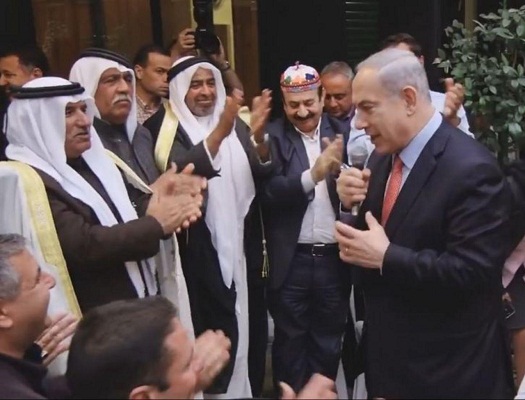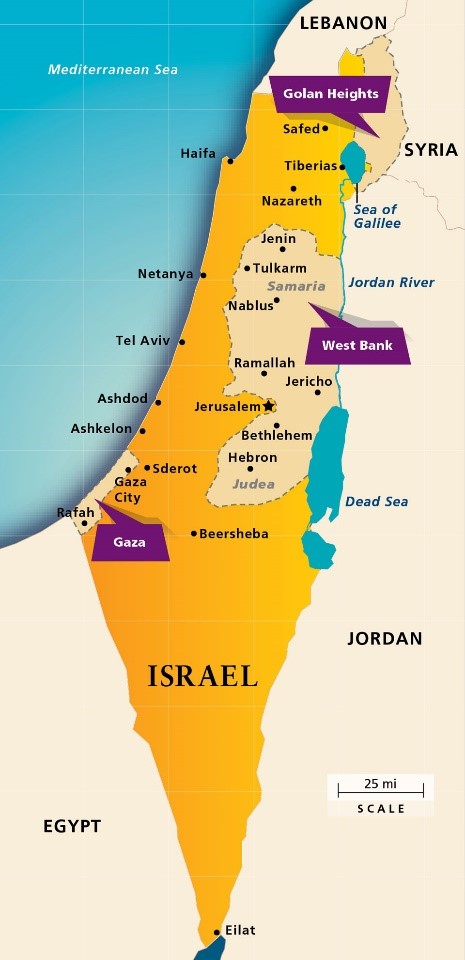Arab countries on Israel – PA conflict
February 16, 2019 | Expert Insights

At the Warsaw Conference on the Middle East, senior Gulf officials played down the Israeli – Palestinian conflict, by justifying Israel’s right to defend itself. They are focusing on Iran as the greatest threat to regional peace.
Background
The status of Jerusalem is one of the most contested issues between Israel and the Palestinians. Both Israel and the Palestinians claim Jerusalem as their capital. The Arab–Israeli conflict refers to the political tension, military conflicts and disputes between a number of Arab countries and Israel in support of Palestine. Territory regarded by the Jewish people as their historical homeland is also regarded by the Pan-Arab movement as belonging to the Palestinian Arabs. The nature of the conflict has shifted over the years from the large-scale, regional Arab–Israeli conflict to a more localised Israeli–Palestinian conflict.

Analysis
The Mideast conference in Poland, which is sponsored by the United States and Poland is aimed at promoting peace and security in the Middle East. It is also intended on isolating Iran.
Israel has signed peace accords with Egypt and Jordan, but other Arab nations have refused to publicly improve relations without significant progress being made toward ending Israel’s half-century occupation of lands sought for a Palestinian state.
Bahrain's foreign minister, Khalid al-Khalifa, said Iran is a far bigger threat to regional security than the long-running Israeli-Palestinian conflict. "We grew up talking about the Palestine-Israel dispute as the most important issue," he says. "But then at a later stage, we saw a bigger challenge. We saw a more toxic one, in fact, the most toxic in our modern history, which came from the Islamic Republic, from Iran."
Saudi Arabia’s Foreign Minister, Adel Al-Jubeir, said that Saudi Arabia had made clear its position regarding the Israel-Palestinian Arab conflict. In a series of tweets following the Warsaw Conference on the Middle East, Jubeir wrote that “all those present agreed that the main challenge is Iran's role in destabilizing security in the region,” He added that “the Kingdom made clear its position on the Palestinian issue which is based on the Arab Peace Initiative.” Jubeir’s tweets came after Prime Minister Binyamin Netanyahu’s office published a video from the Warsaw conference in which Jubeir, along with several other Arab diplomats, are seen strongly criticizing Iran.
The Arab Peace Initiative, unveiled by Saudi Arabia in 2002 and re-endorsed at the 2007 Arab League summit, stipulates that 22 Arab countries will normalize ties with Israel in return for an Israeli withdrawal from Judea and Samaria. Israel to date has rejected the 2002 Saudi proposal due to the fact that it calls for Israel to accept the so-called "right of return" for millions of descendants of Arabs who fled pre-state Israel, effectively bringing an end to the Jewish state.
In 2016, Netanyahu and then-Defense Minister Avigdor Liberman said in a statement they were ready “to negotiate with the Arab countries on updating the Arab Peace Initiative, to reflect the dramatic changes since 2002, and to maintain the agreed goal of two states for two peoples.” Jubeir rejected Netanyahu’s demand at the time, arguing that the Arab Peace Initiative is the best solution for the conflict.
Iran has denounced the conference, as an American anti-Iran “circus.” Russia has said it will not attend, and the European Union’s foreign policy chief, Federica Mogherini also skipped the event.
Israel has identified Iran as its greatest threat. It has vowed to prevent Iran from establishing a permanent military presence in Syria and has carried out scores of airstrikes on Iranian targets in the neighbouring country.
The Palestinian government - which has labelled the Warsaw conference an "American conspiracy" - has refused talks with the US until it starts what it calls a more balanced policy. "By fully siding with the Israeli government, (the Americans) have tried to normalise the Israeli occupation and the systematic denial of the Palestinian right to self-determination," said Nabil Shaath, an adviser to Palestinian president Mahmoud Abbas.
Assessment
Our assessment is that Israel and Arab countries are coming together to denounce the regime in Iran, accusing it of destabilizing Yemen, Syria and Iraq. We feel that Israel has developed good relations with several Arab states despite having no official ties. This would reflect in the tussle for power between the Shai and Sunni forces in the Middle East.








Comments